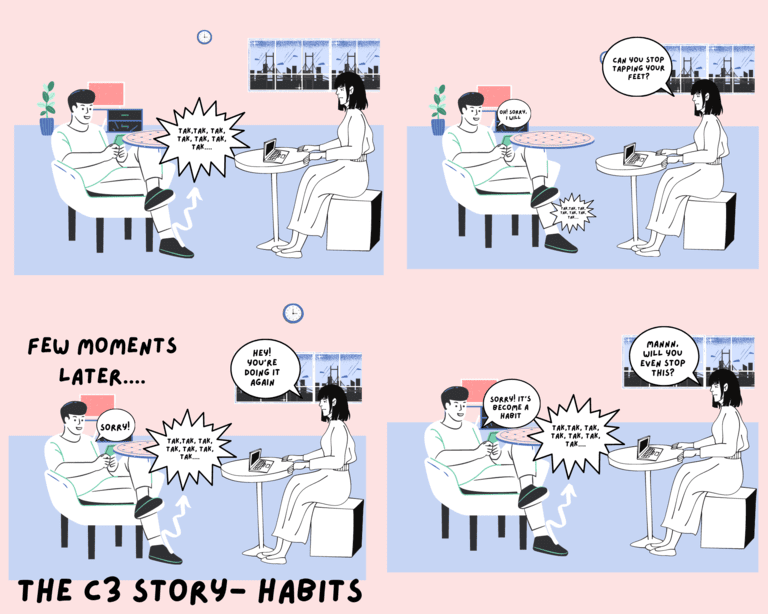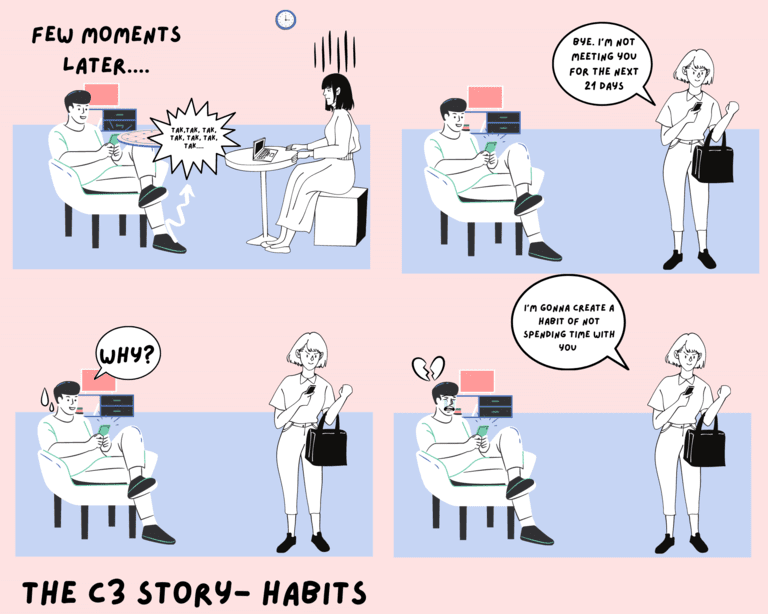Community & Cold Coffee Ep - 9 🥤😎| Cultivating Habits in a Community
C3 has a habit of not having an agenda. This habit is what made the entire first season of C3 a success. This week’s C3 was about something we strongly believe in - forming habits in a community.


Habits travel with us from the cradle to grave. That’s how powerful it is. Here is how a habit works: if you take the ‘H’ out of habit, you still have a bit, if you take ‘HA’ out of it still some bit remains, when you take the ‘HAB’ out of it, still it remains.
When a person inculcates a habit, he/she tends to hold on to it for a lifetime, even if he tries to take that away from his life still, a bit remains. The idea of habits in a community is to induce the way of coming to a community frequently. That makes coming to a community a part of their habitual way of life. That is why setting habits in a community is not something that cannot be overlooked. Habits are something that can stick to your life system if a person gets himself to do it for 21 to 30 days. This week’s C3 was just for an hour, but it did pull out things that can come with us for a lifetime.
Looking down at things given out by experiential community people can help us define habits in our community.
The chat put its hands first in defining habits in a community
Prerona - Habits can have 2 branches to it, 1- the guidelines, rules, handbook, etc, and 2 - Rituals.
The first part doesn’t have much to say, but the second part is what makes the atmosphere of the community.
a) It gives structure to the community
b) Stop new members from feeling lost
c) Evolves faster than rules or guidelines
Deepak - A habit is often looked at as something that is done together. But that cannot always be the case. A good community habit should be in a way that influences a person to carry that habit in his personal life and practice it.
Shaksham - Things done consistently will create and inculcate habits. Others will start to absorb it and start following it, forming the whole habits in a community.
Karthikeyan- Practise conditioned to timelines is an effective way to inculcate habit.
Nisha - Habits take time, in the beginning, to be created. Habits have to be created according to your community’s purpose. In a community scenario, responding and solving other people’s problems has to be its habit. When this habit makes the community manager redundant and the whole community becomes self-driven, that’s when a community succeeds.
Varu - Habits are not made, it is developed when people follow them for a consistent period. When we see someone doing something for a consistent time, we follow, and then it multiplies. Different habits contribute to rituals. For example, there is a foodie community all liking food, and going out to eat is a habit, but going out together at a specific time is a ritual. This has to be involuntary and self-driven.
What could we possibly talk about once we have defined what habits mean in a community? Yes! It’s inevitable to think about what, when, and how to implement these in your community. The people in the chat felt the same and started exploring around it.
What to do, How to do it, and When do we do it?
What to do? Know your purpose, have a framework for your habit, and build a community around it, and then set the tone and culture.
How to do it? Identify a habit that is closely related to your community and create habits in a way that tunes your community once that is done right, then call in people. People who love the idea and want to be a part of it will join in eventually. Make sure this entire process involves the community manager, cause they are the ones who are going to walk closely with the community.
When to do it? Setting habits start from the very start of the community- people who come in will try to absorb things and coincide with things there. If you set your habits right from there, people will easily start following if right from the beginning.
To sum this up, Varu put all these ideas in a more easy-to-understand form saying, “it is not when and how you do it. It is just that one step you take at the beginning that will make the other person take 10 steps for you. As a community manager, you get to provide what they want; then the community will be a success”.
When talking about community and the process of setting them, a platform is vital, and that’s why the chat took its way unraveling this aspect.
Where can the community be built?
Go where your community members are rather than bringing them to where you want them to come. Find where your community members are and capitalize and leverage on that.
A community is movable. You can start anywhere and then take them anywhere once they get mature. Because when people start finding value in something, they will start learning new things to get that value. In that stage, you can change your platform and people will love to come along with you
Triggers that form habits
Triggers are important for fueling something. Having these triggers in your hands can help you trigger habits in your community.
Clear communication of ideas, purpose, and values of the community to the members of the community is crucial in the habit-building process. This will tell the member what to expect and what do you expect in the community. When this is done right, people will simply start adapting it.
FOMO and peer pressure can help people follow habits in a community- when every member of your community follows a habit the members who don’t follow start to create a FOMO inside themselves which will make them practice the habit just to feel belonged with the others.
Co-building the value system, where the members are the stakeholders, will make members feel recognized. This would encourage them to take up habits and follow them.
Challenges- this excites people, seef]d topics where people can come and engage.
Peer recommendation- Peer recommendation is seen as the strongest form of a trigger, as people tend to trust and take in perspectives when they come from a peer. They not only take it but genuinely put it to practice, which becomes a habit.
Takeaways
Habits are not only things that are done together, individual perspectives and habits created by the influence of the community in their personal lives are also very important in a community.
Create habits according to the community’s purpose and build your community around it.
Do what your members need.
Following a habit for a consistent time will make people follow, and the cycle starts to multiply.
Creating a self-driven community is vital where the community manager is redundant.
This week’s chat came to an end with people having a bag full of insights, or a library of resources that can come of help while setting their community habits.
This week’s chat also ended the first season of community and cold coffee in a very successful way. Cheers to the amazing time and insights, we got to share with around 40 people, and a huge kudo to those who made this time cherishable. Hoping and excited for a new start, which is bigger and better.


 Habitate
Habitate